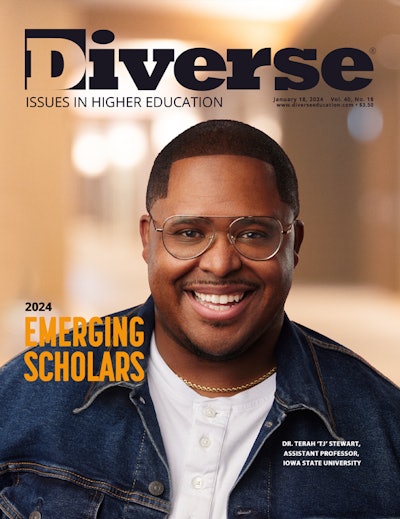Diverse: Issues In Higher Education's 2024 Emerging Scholars shared sentiments of drive, hope, community, and validation during a webinar Thursday.
To accompany the release of its 2024 Emerging Scholars magazine edition, Diverse hosted its first-ever panel for the 15 outstanding scholars it recognized this year. The panel was moderated by Dr. Jamal Watson.
Highlighted with individual profiles throughout the magazine, the 15 scholars hail from a range of academic disciplines – including education, STEM, and architecture – and cultural backgrounds.
The panelists expressed gratitude and pride over being recognized for some of the diversity and equity work that they’ve been doing, work that typically does not garner widespread attention.
"It's been something that has sustained me in academia, the service work that I do,” said Dr. Melva Treviño Peña, an assistant professor at the University of Rhode Island. “To be able to be recognized on this level for the work that I do is really validating. The work that we're doing is what allows other students and people who come after us to be here."
The webinar allowed Diverse to inquire further about the scholars’ ongoing research and their views on a number of topics relevant to the current education landscape.
Scholarly research should be made accessible and legible for people not in academia, the scholars agreed.
"My mom immigrated to this country with nothing more than five dollars in her pocket and an eighth-grade reading level,” said Taifha Alexander, CRT Forward project director at UCLA School of Law’s Critical Race Studies program. “My sisters and I joke that, somehow, she has an M.B.A., two J.Ds, and an LLM because that's what we have, and without her, we wouldn't have been able to achieve those things.
“And so, I honor her by being able to ensure that she herself would have been able to read the research and data that we collect. I think that it's important to do that work as resisting the gatekeeping that exists inherently in academia."
According to the scholars, knowledge isn’t exclusive to the ivory tower, and academics will do well to listen to the desires and input of members in the communities they do work in.
Dr. Terah “TJ” Stewart views those that he research and writes about as collaborators and said that he takes into account how they want their stories shared.
"People have been generating knowledge and theorizing in the streets, the hoods, the barrios for generations, longer before the academy,” said Stewart, an assistant professor of higher education at Iowa State University. “It's pretty problematic to just assume that that's only happening here or that it only needs to stay here."
Dr. Luis Antonio Leyva, an associate professor of mathematics education and STEM higher education at Vanderbilt University, said he “decentered” himself in his research lab and instead sought to highlight different perspectives and interdisciplinary strengths from others.
"One of our lab members is well-versed in trauma-informed ways of interviewing,” Leyva said. “That could be really translational in terms of interviewing students who are coming from historically marginalized communities where STEM has been a form of racialized trauma for them."
Some of the scholars spoke about sharing with students their own stories of inexperience – flawed presentations and unfamiliarity with financial aid processes – to relate to and guide them on how to do better.
The Emerging Scholars also supported encouraging students to engage in research, disagree with mentors, prove their cases, and strive for positive change.
"I'm not going to be an academic forever,” said Dr. Renae D. Mayes, an associate professor of counseling in the University of Arizona’s department of disability & psychoeducational studies. “I will pass the torch to you. And you will get closer to liberation than I ever will. And so, inviting and encouraging students and being a part of those conversations, not only of what is but what could be, is so important."
The scholars – and many others in higher ed and beyond – continue their work as ongoing culture wars flare up in the U.S. and ideas of diversity, equity, and inclusion (DEI) and critical race theory (CRT) are hounded by opponents on the political right.
Dr. Jorge Burmicky, an assistant professor of higher education leadership and policy studies at Howard University, praised Diverse for acknowledging DEI work in academia, saying he felt motivated by it.
“I think that many of us are doing research with a little bit of fear but also just feeling empowered that this work is more needed than ever before,” Burmicky said. “Just being recognized by Diverse ... was really meaningful."
And despite such attacks, Alexander remains hopeful. Drawing on the work of legal scholar Kimberlé Crenshaw, Alexander said that fights over the advancement of civil rights, DEI, and CRT, tend to fluctuate along “hills and valleys.”
"While we most certainly are in a valley right now, what makes me hopeful is the idea that a peak of progress is always on the horizon,” Alexander said. “It's about being in community with the folks who pour into my cup. It's about knowing that scholars like the Emerging Scholars here that I'm honored to be alongside, are doing the work that needs to be done. Because that's going to get us to where we need to be, up out of this valley and onto the peak of progress."
Over the next two weeks, Diverse will feature individual profiles of all of the scholars on our website.





















